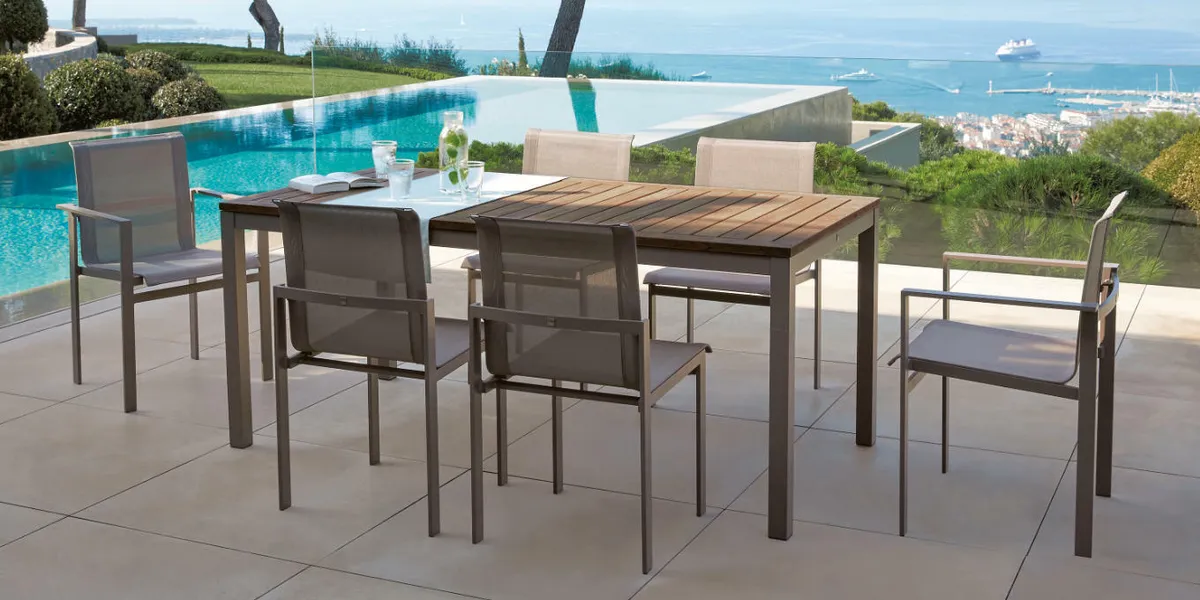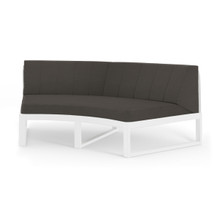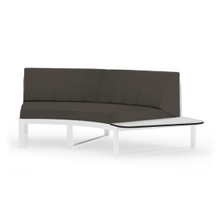Powder-Coated Aluminum Patio Furniture

















Aluminum patio furniture - An ideal choice for outdoor spaces
If you're looking for high-quality deck furniture, consider collections with aluminum frames. This sturdy alloy has advantages over other outdoor materials, comes in various forms and finishes and is a popular choice among designers and upscale homeowners. Like all metal outdoor furniture, it does heat up, so you'll want to consider all-weather seat cushions for added comfort.
The many benefits of aluminum
Aluminum's structure and performance give it an edge over other metals, woods and plastics.
Rust-resistance & corrosion protection
Aluminum doesn't rust and resists scratches. This is due to a natural protective layer of aluminum oxide, which forms when the alloy is exposed to oxygen. The thin non-porous layer tightly adheres to the metal and prevents further oxidation. If scratched, it regenerates to continue protecting the underlying metal. This protective layer does not flake, so it also helps aluminum resist corrosion, although saltwater environments do make the metal more vulnerable over time. This gives it an advantage over iron or steel for use outdoors.
Strength
Aluminum has a crystalline atomic structure with metallic bonds, which give the metal flexibility and strength (though less than steel). While pure aluminum is relatively soft, it's typically alloyed with other metals such as copper, magnesium, silicon, manganese and zinc to increase its tensile strength and hardness. Heating and processing treatments like hammering or rolling can also improve aluminum's strength and structural integrity.
Lightweight
Another advantage of aluminum is its relatively light weight. It has a low atomic mass and lower density than steel or copper but its crystal structure still gives it the strength needed for furniture frames. This portability enables you to easily move aluminum furniture to different positions on your deck or patio, or store it during the off-season.
Low maintenance
Garden furniture made with aluminum is easier to care for and requires less maintenance than other materials. Its resistance to rain, snow, UV radiation, temperature fluctuations and corrosion allows it to withstand extended exposure to the elements without additional treatment. Its durability and strength mean fewer repairs and replacements. Because aluminum doesn't warp or crack like wood, you don't need fillers or sanding to keep outdoor dining sets and lounge chairs looking great.
Versatility
Aluminum is a versatile material for making patio furniture due to its unique combination of physical, chemical and aesthetic properties. Sturdy yet lightweight, aluminum is malleable and can be shaped into sophisticated designs and still support significant weight. Its weather and damage resistance allow aluminum to endure environmental exposure in many climates in residential and commercial settings alike. Aluminum frames can be polished or coated in color to coordinate with any decor palette or style.
Cost-effective
Aluminum possesses many of the benefits of other metals like steel but at a much lower price. Because it's durable, aluminum outdoor furniture doesn't need to be frequently replaced - saving even more money in the long-run.
Forms of aluminum
Aluminum can be processed into different forms with unique properties suited for a variety of applications.
Extruded aluminum
Heated aluminum billets are forced through a die to create continuous elongated pieces. These are typically tubes, bars, channels and other complex cross-sectional designs. The pieces are then cut or bent into shape and welded together. Extruded aluminum has a high strength-to-weight ratio and smooth surface, which makes it great for frames and long structural components.
Cast aluminum
Molten aluminum is poured into a mold and allowed to cool and solidify into the designated shape. Casting methods include die casting, sand casting and permanent mold casting. While cast aluminum has a lower strength than wrought aluminum, it's still sturdy and can be shaped into intricate ornate designs that may be more decorative than functional. This form of aluminum is often preferred for its aesthetic heirloom quality.
Wrought or forged aluminum
Heated aluminum is mechanically worked into its final shape via rolling, forging or extrusion. Examples of wrought aluminum forms include plates, bars, sheets and extruded profiles. It's typically stronger than cast aluminum and can shaped more easily without cracking. This makes wrought aluminum great for outside furniture frames and panels.
Finishes for aluminum
This alloy's surface is suitable for finishes beyond a simple polished or brushed one.
Anodized aluminum
Aluminum is treated to an electrolytic process that creates a thick protective oxide layer on the surface that enhances the metal's resistance to rust and corrosion. Anodized aluminum has a sleek metallic appearance that complements modern deck and pool furniture designs.
Powder-coated aluminum
An electrostatic process leaves a thin protective coating of UV-resistant polyester on the surface of aluminum furniture. Coated metal frames are toughened against damaging rain, cold and scratching. Powder-coating is available in different degrees of durability, matte and gloss finishes, and in many colors to coordinate with outdoor palettes. It's also fade-resistant and doesn't flake like painted metal patio furniture, so it will continue to look great for years.
Decor Outdoor brands with aluminum furniture collections
- Sifas - This French manufacturer's Korol line of outdoor tables is inspired by the iconic Tulip Table and features a flowing cast aluminum base. Their Tuscan-style Kross collection's signature characteristic is the textured blackened wrought aluminum frames.
- iSiMAR - This Spanish company has numerous metal outdoor furniture lines that combine extruded aluminum tubes and bent sheet metal. Their seating, from the flowing lines of the Cadiz Armchair to the familiar bistro style Barceloneta Chair, sets the standard in industrial powder-coated aluminum patio furniture design. Each collection is finished in a protective powder coating in a rainbow of vivid colors or attractive neutral hues.
- Cane-line - Known primarily for their all-weather wicker, Belgian designer Cane-line integrates durable aluminum frames and legs in most of their furniture. Their handy On-the-Move Side Table includes a wrought aluminum wireframe base and a removable sheet aluminum tabletop.
- Mamagreen - Belgian design meets Indonesian craftsmanship and passion for nature in this brand's collections. They mix and match powder-coated aluminum frames with teak, HPL, synthetic mesh and weather-resistant upholstery to create high-performance commercial-grade furnishings. Their stackable Bondi Adirondack features an angular modern aluminum frame, recycled teak slat seat and an airy Batyline or Textilene sling back.
- Skargaarden - This Swedish design firm uses aluminum to support it's largely teak range of garden furniture. However, lounge collections like Arholma and Salto prominently use powder-coated wrought aluminum wireframes to reinforce Scandinavian minimalism.
Quick tips for choosing the right aluminum outdoor furnishings
Aluminum is extremely versatile and can thrive in a variety of outdoor spaces but selecting the right powder-coated aluminum patio furniture requires careful evaluation.
- Type of aluminum - Extruded aluminum is best for sleek contemporary frames, while cast aluminum is great for more traditional, heavier decorative pieces and wrought aluminum offers strength for classic load-bearing furniture
- Type of finish - Anodized aluminum has a durable corrosion-resistant surface with a modern silver color, while powder-coating provides additional protection against the elements and damage, and various colors and textures to coordinate with decor (both types are recommended for humid or coastal salt air environments)
- Construction quality - Inspect joints and welds for strength and smoothness and test tables and seating for balance
- Weight & portability - If you're in a windy or high-traffic area, make sure that aluminum furnishings are heavy enough to prevent tipping over but can still be rearranged or stored (cushions can help weigh down seating)
- Assess comfort - Look for ergonomic designs with armrests and select sofas and chairs sets with sling seating or plush upholstery with quick-dry foam cushion inserts
- Storage & stackability - Look for aluminum furniture pieces that can fold or stack for compact storage when not in use and can be protected by weather-resistant covers
- Budget considerations - Cast and wrought aluminum is typically more expensive than extruded versions and premium finishes and cushions can add costs but you should balance upfront expenses with durability, maintenance and replacement costs